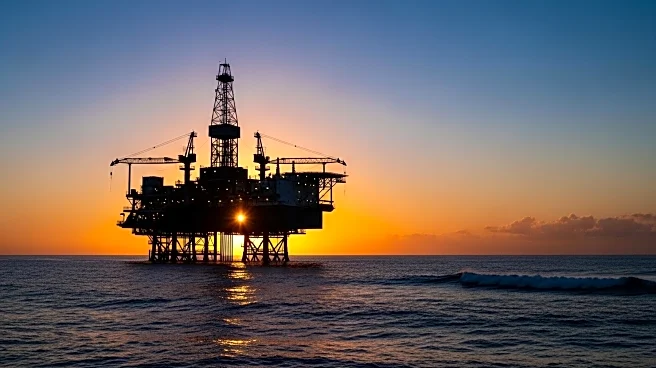What's Happening?
BP has announced a significant oil and gas discovery in Brazil's offshore Santos Basin, marking its largest find in 25 years. The discovery was made in the deepwater Bumerangue block, which revealed a 500-meter gross hydrocarbon column in a high-quality pre-salt carbonate reservoir. This discovery is part of BP's strategic shift back to increasing oil and gas production, following a period of reduced investment in renewables due to poor returns and regulatory challenges. BP plans to invest $10 billion annually in upstream oil and gas, aiming for 10 new major projects by 2027 and additional projects by 2030. The Bumerangue discovery is expected to significantly boost BP's production capabilities, with estimates suggesting recoverable resources of 2.0-2.5 billion barrels of oil equivalent.
Why It's Important?
The discovery in Brazil is crucial for BP as it seeks to strengthen its position among the world's major oil companies. With a potential production plateau of 400,000 barrels per day, the Bumerangue block could provide substantial cash flow to support BP's restructuring and energy transition strategy. This move reflects a broader industry trend where major oil companies are refocusing on exploration to meet global energy demands, despite previous commitments to reduce fossil fuel production. The shift back to exploration highlights the ongoing challenges in balancing energy security with environmental concerns, as companies navigate the complexities of transitioning to cleaner energy sources while maintaining profitability.
What's Next?
BP's discovery is expected to lead to increased exploration activities in Brazil and other promising regions. The company plans to establish a significant production hub in Brazil, with first oil projected between 2031 and 2033. As BP and other major oil companies continue to invest in exploration, they may face environmental and regulatory challenges, particularly in regions like South Africa where exploration efforts have been halted by court mandates. The industry will likely see further strategic adjustments as companies aim to balance exploration with sustainable practices, potentially influencing global energy policies and market dynamics.
Beyond the Headlines
The renewed focus on oil exploration raises ethical and environmental questions about the long-term impact of fossil fuel dependency. As companies like BP increase production, they must also address the environmental consequences and public scrutiny associated with oil exploration. This development could lead to intensified debates on energy policy, climate change, and the role of major oil companies in shaping the future of global energy supply.










